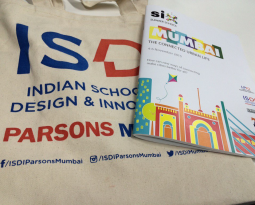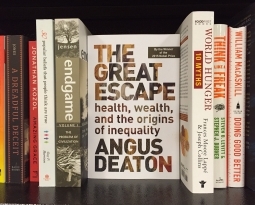Angus Deaton, Not Your Plain Vanilla Economist
odcasts. I love them. I run, hike, and fold laundry while listening to them. So when Nobel-prize winners began rolling out fast and furiously last month, I made a mental note to search for interviews with the winners.
As it happens, one of my favorite regular podcasts – a new one called Benchmark at Business Week – immediately featured an interview with Angus Deaton, Princeton University professor and winner of the 2015 Nobel Prize in Economics. Looking forward to an infusion of developmental economics – it had been awhile – I tuned in to Benchmark.
I learned that Angus Deaton was a data scientist (!!) – whose first tools were a pencil and notebook.
The Revelation Unfolds
I enjoy the unique combination of smarts and informality that characterizes Benchmark, hosted by two young women (Tori Stilwell and Aki Ito, both millennials, a point often emphasized) and their more senior colleague (Dan Moss, Gen X?). For the interview with Angus Deaton, I found their approach charming and informative. (For the record, I was not at all bothered by the somewhat noisy background the hosts expressed concern about.)
When I heard this interview, I’d already heard several others – conducted mostly by buttoned-up media types who seemed to start their interviews with what appeared to be conclusions and then ask for comment from Professor Deaton.
Sigh.
In contrast, Benchmark’s was refreshingly open. Tori asked Professor Deaton about his contributions to the field – about why he won the prize. She was looking for the “ta-da” – the big finding.
He replied that the award was the result of “a broad swath of work,” rather than any one discovery, “If you work with numbers, you stand on the shoulders of other giants.”
“I used to feel real bad when people would say to me ‘so what’s your hypothesis?…You should be testing a hypothesis.’ I’d say, ‘I just like playing with the numbers. I like to find patterns in them.’ [It’s those] patterns that relate to other hypotheses or other theories.”
He also remarked on the importance of advances in visualization tools (“fast graphics”) have made patterns much easier to see.
“There’s no substitute for peering at the numbers and asking where they make sense and whether they are consistent with other numbers and with the larger picture we hold…[asking] what do they tell us? Do they fit with the way we think about these things?”
At that point I remembered a statement the Professor had made earlier in the week, “Measurement is at the center of what I do.”
And that’s when it hit me. Angus Deaton is a Data Scientist. Dubbed by HBR as the “Sexiest Job of the 21st Century” (!), the data scientist is part artist, part analyst. The best ones have a deep understanding of data itself and the important questions it can help answer – a role whose importance was made evident to me during a recent HackOregon education project.
I don’t’ think where you start matters, you need to poke at both [numbers and theories] and then pull them together.
– Angus Deaton
The ‘So What’
Having now Googled many of Deaton’s other interviews, papers, and ordered a copy of The Great Escape (on back-order in what can only be a good sign…), I’m wowed by the depth, thoughtfulness, and relevance of his contributions and relieved at their accessibility. Happiness, health, wellbeing, friendship – this is not the stuff of the economics I studied in graduate school where rational self-maximizers ruled the day. And if poverty, inequality, and developmental economics are not your thing, Deaton is also behind the recent headline about rising death rates for white, middle-aged Americans, in case that is of interest.
He insists on a real interrogation of the concepts and frameworks we use to understand the world and calls us out when we could do better.
Whatever we want to call that role is fine with me, so long as we take it seriously. When Deaton started out, we were data poor. Now we’re now drowning in data. The world needs us to be disciplined in both identifying the most relevant questions and bringing to them the best possible data.
[Note: For a really enjoyable curated collection of information about Angus Deaton, check out his hashtag.]






